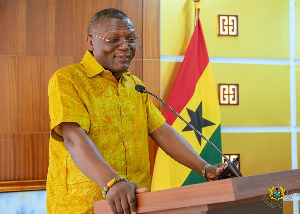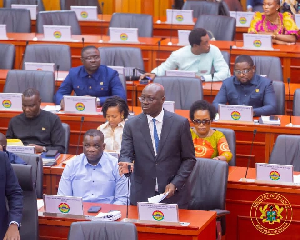Accra, June 1, GNA- The Planned Parenthood Association of Ghana (PPAG) on Friday launched its 40th Anniversary celebrations under the theme; "40 years of Excellence in Reproductive Health: The Way Forward in the face of Dwindling Resources."
The celebration, which aims at taking stock of the achievements and challenges of the past years, would also help the Association consider the way forward to strengthening its policies and programmes to perform better in the years ahead.
Nana Frimpong Anokye II, Omanhene of Agona, who chaired the launch on Friday, called for total sacrifice and commitment by all citizenry and Government in particular, to ensure that policies and programmes on Sexual and Reproductive Health were supported and propagated to the remotest corners of the country. He said though the PPAG had chalked successes in bringing down birth rates, fertility levels as well as enhanced Adolescent and Sexual Reproductive Health (ASRH) education, there was more to be done, especially in the rural areas, where tradition and culture were deeply routed.
"For Ghana to be lifted out of the vicious cycle of poverty, population lines had to be brought down and stabilised, to ensure that various programmes and poverty reduction interventions received maximum impact," he said.
He expressed worry over the fact that in spite of the numerous health interventions and education on Family Planning as well as other ASRH programmes, most people, especially in rural communities continue to have large families through their incomes did not match their family needs.
He called for a redoubling of efforts to be able to reduce the level of poverty through quality health of women and children, who were the most vulnerable.
Nana Anokye II, who also represented the Asantehene, Otumfuo Osei-Tutu II, the Life Patron of the Association, commended the founding members for their vision and dedication to the service of the nation. He said Ghana needed such calibre of people who would volunteer their services without expecting any financial reward, and encouraged the youth to emulate not only what the founders of PPAG, had laid down, but also other national programmes and projects.
"This would go a long way to help Ghana take a lead in halving poverty by the year 2015 as stated by the United Nations Millennium Development Goals," he said.
Dr Gladys Norley Ashitey, a Deputy Minister of Health, applauded the work of the PPAG, saying its commitment to Sexual and Reproductive Health education and other services, had contributed to a large extent a reduction in the high birth rate and quality reproductive health of women among others.
She mentioned various youth programmes such as the Young and Wise, Youth Action Movements and the establishment of Youth friendly clinics and cyber cafes, as avenues for knowledge and information sharing that had helped the youth make informed choices.
Dr Ashitey said since the youth formed majority of the country's population, it was important to priotise their health status to a large extent, as it determines the extent of development of the country. She stated that inspite of the daunting task of addressing sexual behaviours, government was committed to partner with the PPAG and other organisations working towards the same course to build upon what had been already achieved.
She said the MOH was strengthening the public-private partnership of the health sector by including the membership of the private sector in the management of the health sector at the Regional and District levels, and in national level policy dialogue, decision making and programme implementation.
"We are also exploring innovative public-private partnerships including establishing management contracts for publicly funded projects and facilitating accreditation of private health care providers for the National Health Insurance Scheme," she said. Dr Ashitey said with government's view of the private sector as the engine of growth, it was necessary that for the policy trust of the Ministry, the private health sector was driven to become a significant contributor to its vision of "Creating Wealth through Health." The Deputy Minister however, expressed worry over the rise in the national prevalence of HIV as recorded by the 2006 Sentinel Report, and called on all stakeholders not to relent in their efforts at stabilising the trend.
She said the current prevalence of 3.2 percent, was unacceptable and needed strong networking and collaboration to be able to change behaviour of people especially the youth.
She called on the District Assemblies and other government organisations to involve collaborate with the PPAG in their health management programmes, saying it would ensure the expansion of services and practically consolidate sustainability of projects.
Dr Richard Turkson, a former President of PPAG, appealed to government to redeem its annual contribution to the IPPF's core fund, which he said had lapsed over the past few years.
"I have no doubt whatsoever that giving government's firm commitment to Family Planning and Reproductive Health programmes, as an essential component of its growth and Poverty reduction strategy, my appeal will receive a compassionate hearing and a positive response," he said.
Dr Turkson recounted the numerous challenges that the Association had gone through in its efforts to break the ice surrounding Sexual and Reproductive Health in Ghana, as well as financial support its programmes.
He stressed that the Association had depended in part, on the strength of the partnership between its volunteers and staff with respect and understanding of each other's role.
He called for extended collaboration with other NGOs to ensure the implementation of other programmes of Action, which would contribute to the attainment of the MDGs. Dr Turkson said the Association seeks new and better ways of turning the concept of volunteerism to the best possible advantage, even in the face of the gradually dwindling resources arising from the vagaries of international donor funding. He noted that a cut in bilateral funding had affected the programmes of the Association, yet it resorted to interesting and innovative ways of local resource mobilisation such as its successful marketing strategy, including franchising and internal income-generation through consultancies.
He encouraged the PPAG to broaden and strengthen these strategies because it could be the pathway to financial sustainability and self-independence from the IPPF. Mrs Frances Owusu Daaku, President PPAG, said the Association, which had been in existence since 1967 as a voluntary founded by the late Dr Barnor, a then medical practitioner, was supported by a few volunteers who sacrificed their time, money and experience to build a solid foundation for the Association.
She explained that the PPAG had since worked hard to gain both local and international recognition and was currently a member of the International Planned Parenthood Federation (IPPF), and aims at providing Reproductive Health as well as other services to the people of Ghana. She reiterated the appeal to the public to support its activities by volunteering their services to the course of the PPAG for a better future for the country. 01 June 07.
Regional News of Friday, 1 June 2007
Source: GNA












